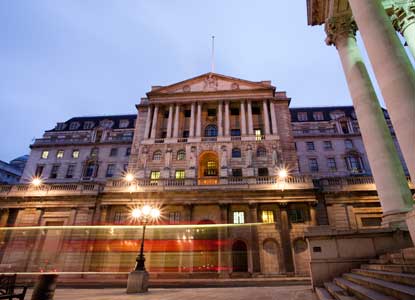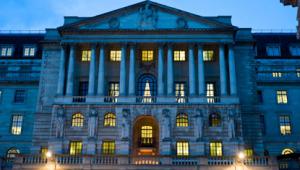By Richard Johnstone | 24 August 2012
The Bank of England should move beyond the narrow inflation measure ‘that did nothing to prevent the deepest recession for almost 70 years’, a leading think-tank said today.

House price rises in particular should be given equal weight to the Consumer Prices Index when interest rates are set, Tony Dolphin, chief economist of the Institute for Public Policy Research, said. Other costs, such as commodity prices, should also be taken into account.
Currently, the Bank’s Monetary Policy Committee sets interest rates to keep CPI inflation at around 2%.
Dolphin highlights that despite the economic crisis of 2008, the way monetary policy is conducted has barely changed for 15 years. The government sets an inflation target and the MPC adjusts its short-term interest rate, or uses quantitative easing, to meet this target.
However, in 2006 and 2007 before the economic crash, the Bank of England was so focused on inflation that it ‘was turning a blind eye to a financial bubble that had been developing for years’, Dolphin said.
‘Business as usual at the Bank of England must come to an end’, he added.
If the MPC was given additional targets, it would pay greater attention to asset price changes.
‘While the effect the Bank of England can have on oil prices is limited, they should nonetheless be aware of the risks they can pose to the economy. The housing market is a different matter and, at the very least, house prices should be given the same weight in policy deliberations as consumer prices.
‘It is time for the Bank of England and the Treasury to abandon their narrow models and develop a more complex understanding of the impact of policy interventions.’
The Macroeconomics in a complex world essay is part of a new collection, Complex new world: Translating new economic thinking into public policy, released today by the IPPR.
The report comes as the Bank of England defended the impact of its quantitative easing programme on pension funds.
The Bank’s £375bn asset purchase programme, which is mainly focused on buying government bonds, has been criticised by some pension funds for reducing yields on gilts and therefore investment returns.
However, a report published yesterday stated that most people in the UK would have been worse off without the ‘unprecedented’ response to the financial crisis, including savers and pensioners.
‘All assessments of the effect of QE must be seen in that light,’ the report stated. ‘QE has caused the price of gilts to rise and yields to fall, in turn leading to an increase in demand for, and price of, a wide range of other assets, including corporate bonds and equities. That has lowered borrowing costs for companies and households and increased the net wealth of asset holders, both of which have acted to stimulate spending.’
Any impact of QE on pensions was for people who were approaching retirement when the asset purchase programme began in 2009, the Bank said.
However, the report, The distributional effects of asset purchases, added: ‘QE is estimated to have had a broadly neutral impact on the value of the annuity income that can be purchased from a typical personal pension pot invested in a mixture of bonds and equities’.





















